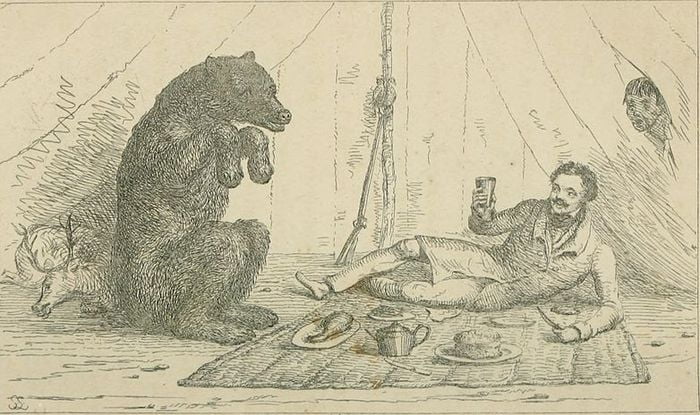Samuel Lover (1797?—1868)
Samuel Lover was born in Dublin of an English Protestant family. He studied painting at an early age, and though he continued to practise that art, he soon discovered his talent for writing. Many of his most delightful sketches of Irish life appeared in various Dublin periodicals in the early thirties. In 1832 he published his Legends and Stories of Ireland, in which The White Trout is found. The best known of his novels is Handy Andy.
The White Trout is reprinted from Yeats` Irish Fairy and Folk Tales; New York, no date.
The White Trout
There was wanst upon a time, long ago, a beautiful lady that lived in a castle upon the lake beyant, and they say she was promised to a king`s son, and they wor to be married, when all of a sudden he was murthered, the crathur (Lord help us), and threwn into the lake above, and so, of course, he couldn`t keep his promise to the fairy lady—and more`s the pity.
Well; the story goes that she went out iv her mind, bekase av loosin` the king`s son—for she was tendher-hearted, God help her, like the rest iv us!—and pined away after him, until at last, no one about seen her, good or bad; and the story wint that the fairies took her away.
Well, sir, in coorse o` time, the White Throut, God bless it, was seen in the sthrame beyant, and sure_the people didn`t know what to think av the crathur, seein` as how a white throut was never heard av afor, nor since; and years upon years the throut was there, just where you seen it this blessed minit, longer nor I can tell—aye throth, and beyant the memory o`- th` ouldest in the village.
At last the people began to think it must be a fairy; for what else could it be?—and no hurt nor harm was iver put an the white throut, until some wicked sinners of sojers kem to these parts, and laughed at all the people, and gibed and jeered them for thinkin` o` the likes; and one o` them in partic`lar (bad luck to him; God forgi` me for saying it!) swore he`d catch the throut and ate it for his dinner—the blackguard !
Well, what would you think o` the villainy of the sojer? Sure enough he cotch the throut, and away wid him home, and puts an the fryin`- pan, and into it he pitches the purty little thing. The throut squeeled all as one as a Christian crathur, and, my dear, you`d think the sojer id split his sides laughin`—for he was a harden`d villain; and when he thought one side was done, he turns it over to fry the other; and, what would you think, but the divil a taste of a burn was an it at all at all; and sure the sojer thought it was a quare throut that could not be briled. “But,” says he, “I`ll give it another turn by and by,” little thinkin` what was in store for him, the haythen.
Read More about Van Lake








